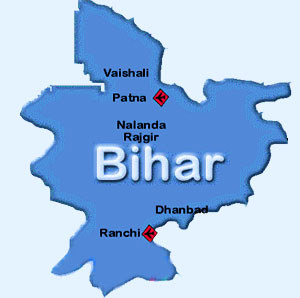With crops failing, 3.3 mn people in Bihar risk death by hunger
 Patna, Nov 30 - Over 3.3 million people in Bihar risk death by hunger due to a new enemy. A senior official has blamed climate change for this year's drought, which has placed so many people at risk.
Patna, Nov 30 - Over 3.3 million people in Bihar risk death by hunger due to a new enemy. A senior official has blamed climate change for this year's drought, which has placed so many people at risk.
"It seems that climate change is responsible for drought in 26 districts of the state. Crop production is falling. And it has largely affected districts that were earlier flood-prone," the Bihar government's Principal Secretary Vyasji told IANS.
"Our estimates suggest that 12.6 million families are affected by this. We have taken family size as five and so the people hit due to drought are 63 million. Of them 3.3 million people are destitute and have no means of livelihood. If our delivery system fails these destitute people would be exposed to high risk of hunger deaths," he added.
The senior official said: "The surface water is drying up. The Indrapuri water reservoir, which was a major source of irrigation in the state, has 40 percent less water this year in comparison to last year. The water level has gone down because of scanty rainfall."
The southwest monsoon -- lifeline of the state's agrarian economy -- was two weeks late in Bihar this year. The actual rainfall recorded during the current agriculture season till Aug 6 was 331.7 mm against the average of 568.5 mm, showing a deficit of 42 percent. The state government has declared drought in 26 districts.
Even in the districts where the rainfall deficit has been less than 20 percent, the rains have been irregular, thus affecting paddy cultivation adversely. In addition, the average increase in the temperature in the range of 5 to 7 degrees Celsius has worsened the situation.
Officials say in case the situation in the remaining districts worsens they may also be declared drought-hit.
The Intergovernmental Panel on Climate Change -- a group of over 2,500 scientists from around the world -- has said one effect of climate change is more frequent and more severe droughts.
Asked about the loss caused by drought, Vyasji said: "We are trying to save the rabi (winter) crop. If it fails then the situation will be worse. If there is low production then we'll have to import
(grain) from Punjab."
"Also we have not received adequate support from the central government so far. But we are hopeful it will come soon. On Aug 9 we declared drought and a week later, we submitted a proposal asking the centre to give us aid of Rs. 23,000 crore (Rs. 230 billion/$4.6 billion). But they have approved aid of Rs. 1,100 crore only," he added.
The monsoon failure has affected not only agriculture but also animal husbandry, drinking water, health and the state's overall economy.
"The shortage of water may also lead to various health problems and diseases among the human beings, turning the situation more severe," said a senior government functionary, who spoke on condition of anonymity because was not authorised to speak to the media.
"Also the absence of work avenues for agriculture labour in the rural areas may cause their migration to other states which would eventually lead to deterioration in the quality of life of the work force and the state may face shortage of labour during Rabi cultivation," the official added.
Rajnish Singh, deputy secretary and at present on deputation with the United Nation Development Programme (UNDP), said that to deal with drought the state has already set up a Crisis Management Group (CMG) and a task force to review and monitor the situation at the district and lower levels.
"We're planning water harvesting systems in all panchayats in every district. The work has been started. We have requested the district magistrates to give people work under the National Rural Employment Guarantee Scheme (NREGS) and the focus should be on constructing such harvesting systems," Singh told IANS.
"We have also planned distribution of relief to the drought-affected families after their grain stock is exhausted. We have issued orders for storing one quintal of grain in every panchayat for combating emergencies."
Vyasji hoped that the world would come together at the imminent climate summit in Copenhagen and reach a consensus. "It's a people issue. I would request developed countries for emission cuts. They (developed countries) are the culprits of climate change," he said. (IANS)